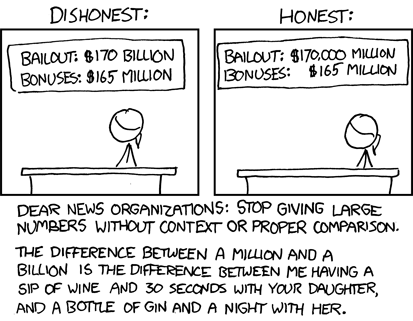
Let's start off with xkcd's lesson in how numbers lie.
As I've been saying both up top and in the comments the significance of this AIG bonus outrage is being badly overblown. The bonuses are a nice red-meat issue for the media circus but they're basically a rounding error with regard to the scale of the bailout as a whole. Nate Silver is basically right here precisely because, as the cliche goes, "hard facts make bad law"—though his comparison to the Terry Schaivo case flounders at the fact that this silly thing the Congress is doing has wide popular support. (Nate and Josh Marshall both have more on the possible unintended consequences of this poorly thought-out new tax.)
As I've been trying to argue, the only relevant consideration regarding the bonuses is whether they were legal contracts, negotiated in the proper way and not predicated on fraudulent accounting or other illegal activity. Andrew Cuomo and Eric Holder should be investigating the bonuses, in other words, not Barney Frank. If they were legal, and their terms were met, pay them out; if they were fraudulent or predicated on fraud, arrest people.
What angers me about this situation is the widespread assumption that of course the bonuses are legal (just ill-advised), just like of course everything AIG did was legal but ill-advised. See, for instance, Ezra Klein on Madoff:
Madoff knew his investment scheme was a fraud. Wall Street should have known their investment schemes were a fraud.Give me a break. Plenty of people on Wall Street knew their investment schemes were fraudulent. Those people are crooks, not dupes, and criminal prosecutions are the way we find out who they are.
(EDITED TO ADD: You can draw a distinction between AIG and Madoff, but it's the distinction between two separate categories of crime, not between the guilty and the innocent.)
Repeating what I wrote in answer to Shankar's question "Criminal Prosecution for what?" last night:
Well, that's the job of state and federal prosecutors to determine. But there's plenty of reason to think that (say) underwritingbillionstrillions of dollars in insurance obligations you know you have no capacity to pay out on is an abrogation of your fiduciary obligations -- just for starters. Fraud and dishonest account methods were rampant in the banking industry, which has strict rules about this sort of thing that plainly weren't followed. It's not *just* stupid -- in many cases it was stupid and illegal. Or so it seems to me.
...To add the obvious disclaimer, I'm not a lawyer, much less a prosecutor. But the treatment of the issue in the media tends to frustrate me on this point. Generally speaking the operative assumption seems to be "Oops, and they all got away with it" -- that what they did was obviously legal, just slimy, and so we're all just going to have to swallow our anger and move on. I don't know that it *was* legal in all cases, and if CEOs and CFOs broke the law in chasing these bogus returns then DOJ and state AGs absolutely need to get involved. It's a much higher priority for me than retributive taxation of contracts that are obscene (but probably legal) in an industry where the payment of obscene salaries is already (and still) an unchallenged norm. The bonuses are peanuts compared to the amount of money that's already vanished.





|